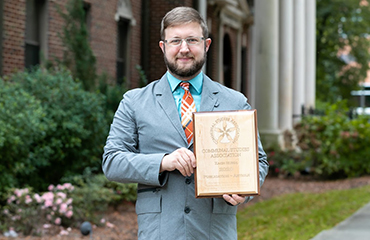
A study on Intentional Communities (ICs), led by a Lander University scholar Dr. Zach Rubin, has received the 2020 Outstanding Publication-Article award from the Communal Studies Association.
The award recognizes research that is reported in the article, "Measuring Success in Intentional Communities: A Critical Evaluation of Commitment and Longevity Theories," which was published in the journal Sociological Spectrum.
Rubin, an assistant professor in the Department of Government, Criminology and Sociology in Lander's College of Behavioral and Social Sciences, examined how modern-day ICs, sometimes referred to as communes, achieve the goals of their communities. The prevailing scholarship in the study of these communities is that communal processes of commitment, as well as ethnic and linguistic homogeneity, have had a strong role in determining a community's success when defined as how long-lived a community was.
"However, most of these conclusions are based in historical research on communities that no longer exist," said Rubin, who conducted the study with Dr. Don Willis, an assistant professor at the University of Arkansas, and Mayana Ludwig, co-founder of the Solidarity House Collective in Laramie, Wyo.
By testing a sample of current ICs, the researchers found that the community decision-making structure is more important than any other factor in determining whether communities report progress toward this metric of success, Rubin said.
"We hope that future researchers will build on our work and utilize the measure of success among ICs we have developed in this study," he said. "By understanding how these tight-knit social groups function, we can begin to infer some processes about building a sense of community in places like Greenwood."
Well-known ICs include The Shakers, a utopian community established in 1776 and the quintessential commune to which others are compared; the Amana Colonies, comprising seven villages which flourished in Iowa until 1932, and the Oneida Community, which was founded in New York and became a silverware company by the same name when it dissolved in 1881.
Founded in 1975 as the National Historic Communal Societies Association, the Communal Studies Association has expanded its focus in recent years to include the study of contemporary and international communal societies.